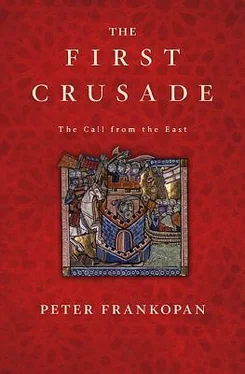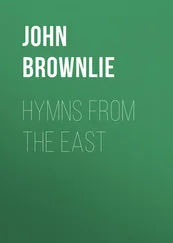These savage attacks on Alexios need to be understood in the context of the oaths that the emperor had demanded in Constantinople in 1096–7, and serve to explain why the Crusaders kept possession of cities like Antioch that should have reverted to Byzantium. The first historians of the Crusade produced such fiercely negative portrayals of the emperor to justify Bohemond’s decision to turn his back on the solemn commitments given to Alexios. This was because the emperor had not fulfilled his promises: Alexios’ betrayals – not the Crusaders’ – rendered the oaths void. According to the Gesta Francorum , the emperor swore to protect the knights and to keep them supplied by land and sea; Alexios also promised to accompany the expedition, bringing soldiers and a fleet with him. 47His failure to appear at Antioch during or after the siege meant that the oaths sworn by the Crusaders were no longer valid. 48
The argument was forcefully made, but the accusations were dubious. Alexios had kept the Crusaders adequately supplied on their way to Constantinople and oversaw an effective system of provisioning at Kibotos and during the assault on Nicaea. The westerners crossed Asia Minor without complaint about inadequate supplies, which suggests that provisioning had been carefully planned and well executed. When the army arrived at Antioch in the autumn of 1098, measures had been put in place by the Byzantines to support a lengthy siege; this was why Anselm of Ribemont could write home reporting that stocks of corn, wine, oil and other goods were larger than could be imagined. 49
That supplies ran short in the winter of 1097–8 was unfortunate; but it was hardly surprising given how hard it was to gather foodstuffs during the winter, and the difficulty of getting provisions through to Antioch across challenging terrain. And in any event, it was not clear how much Alexios was to blame for the hardship that ensued. In a letter Stephen of Blois wrote to his wife from Antioch in March 1098 – at a time when conditions in the Crusader camp were at their worst – he said nothing about the emperor’s failings. 50
On the contrary, provisions clearly continued to reach the Crusaders from Cyprus and Laodikeia, even after Tatikios’ departure from the camp. It was Alexios presumably also behind the food and other materials being sent to the westerners by local commanders in Cilicia and by the Greek monks of the Black Mountain monastery in northern Syria, an institution that historically had close connections with Constantinople. 51And as one Crusade historian freely admits, Alexios’ heralds continued to urge the local population to supply the Crusaders with grain by land and sea. 52After Antioch fell, Byzantine ships carried on bringing supplies to the western armies, attempting to do so, for instance, during the siege of Arqa in 1099. 53
Alexios certainly thought that he kept his part of the bargain in supporting the knights on the expedition. In a reply to a letter by the abbot of Montecassino, sent in June 1098 – just before he received reports of how dire the situation at Antioch had become – the emperor wrote: ‘I implore you earnestly to provide aid to the army of the Franks, your most thoughtful letter states. Let your Venerable Holiness be assured on that score, for my empire has been spread over them and will assist and advise them on all matters; indeed I have already helped them to the best of my ability, not as a friend or a relative, but as a father ... By God’s grace, they continue to prosper in the service in which they have begun, and they will continue to prosper as long as good purpose leads them on.’ 54
There is other evidence that the Crusaders were satisfied with their progress around this time. In his letter to Manasses, archbishop of Rheims, in February 1098, Anselm of Ribemont made light of the problems facing the expedition, concentrating instead on the fact that the passage across Asia Minor up to Antioch had met with no obstacles.
Two hundred towns and fortress had been recovered by the Christians, which Anselm thought to be a considerable achievement. ‘Let the Mother Church of the west’, he concluded, ‘rejoice that she has produced men capable of bringing such a glorious reputation to her and such marvellous aid to the Eastern Church.’ 55In short, there were many in the Crusader army who felt that the expedition progressed successfully in the first part of 1098, and had no grievance or complaint with Alexios. Indeed, the reluctance of the other Crusader leaders to lend support to Bohemond as he agitated for control of Antioch shows that they did not consider the emperor to have breached his obligations.
Quite the opposite, in fact: messages were sent repeatedly from Antioch to Alexios to ask for advice and direction. This was why Stephen of Blois was dispatched just before Antioch was captured; Hugh of Vermandois was sent not long afterwards. Even the hostile Gesta Francorum noted that the message Hugh took to Alexios was unequivocal: Godfrey of Bouillon, Raymond of Toulouse, Bohemond, Robert of Normandy, Robert of Flanders and all the other knights wanted the emperor to come and take possession of Antioch. This is clear evidence that the oaths given to the emperor were considered intact even after the city’s fall. 56
It seems it was only after the Crusaders began to argue amongst themselves that attitudes towards Alexios began to harden. By the autumn of 1098, he had become a lightning rod for criticism, a convenie nt cipher for the squabbles and rival ambitions amongst the Crusade leadership. In September, a letter was sent to the Pope by the most prominent knights taking part in the expedition to report on the terrible difficulties of the previous two years. Jesus Christ had delivered the Crusaders from the Turks who had attacked them from all corners, the letter explained. Nicaea had been taken and, at great cost to the western army, Antioch had also been captured. The knights now begged the Pope to join the Crusade himself, take personal control of the expedition, and finish what he had started. 57
The letter-writers laid out a clear reason for their appeal to the Pope: Alexios had failed the Crusade. They claimed that the emperor had not just neglected to help God’s soldiers, but had actively worked against them: ‘he has placed whatever obstacle he could in our way’. 58Fulcher of Chartres, who reproduced a version of this letter in his chronicle, chose not to include these final comments, feeling them to be unfair and unjustified. 59There is no doubt that by late 1098 a concerted effort was under way to taint the emperor Alexios as the Crusade unravelled after the capture of Antioch.
The main line of attack on the Byzantine ruler now was his failure to come to the city to take control of the situation as the leading Crusaders squabbled among themselves. Hence it was the emperor, and not the western knights, who had broken the bonds made in Cons tantinople. But again, there was questionable substance to this claim. It was by no means clear that Alexios needed to come in person – nor indeed that his failure to do so constituted a breach of the agreement. Why could the city not be handed to one of his representatives, as had been the case at Nicaea and at many other towns in Asia Minor?
In addition, eyewitnesses to the oath-taking ceremonies in Constantinople were clear that Alexios did not give specific guarantees about joining the expedition. On the contrary, as Raymond of Aguilers set out, the emperor stated categorically in the imperial capital that he would not be able to take part in the campaign because of the variety of problems he had to contend with close to home. 60
The Crusaders, in other words, were on shaky ground – and it seems that Raymond of Aguilers for one was aware of it. The chronicler avoided discussing the oaths altogether: ‘Shall I write of the most fraudulent and abominable treachery of the emperor’s counsel? Let anyone who wants to know about this find out from someone else.’ 61
Читать дальше











